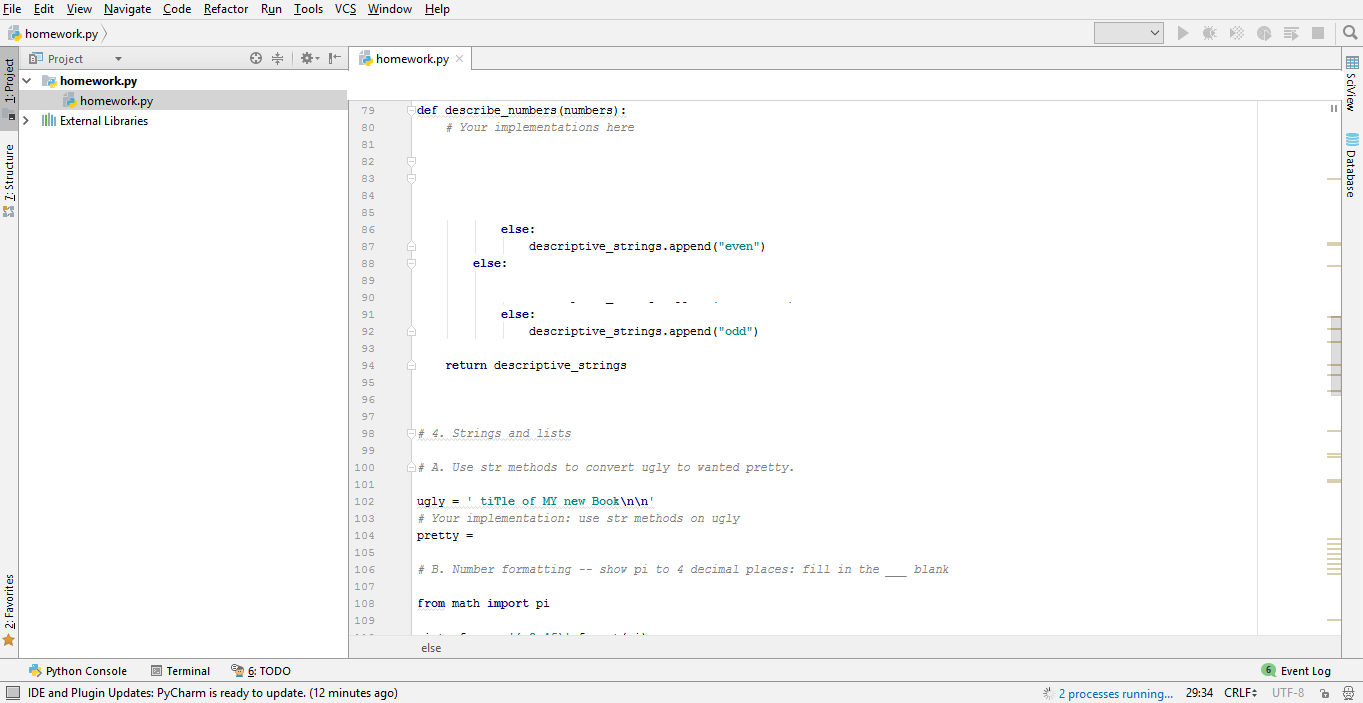Python code completion Assignment
# 1. if-elif-else
# Fill missing pieces (____) of the following code
# such that the "print" statements make sense.
name = 'John Doe'
if ____:
print('Name "{}" is more than 20 chars long'.format(name))
length_description = 'long'
elif ____:
print('Name "{}" is more than 15 chars long'.format(name))
length_description = 'semi long'
elif ____:
print('Name "{}" is more than 10 chars long'.format(name))
length_description = 'semi long'
elif ____:
print('Name "{}" is 8, 9 or 10 chars long'.format(name))
length_description = 'semi short'
else:
print('Name "{}" is a short name'.format(name))
length_description = 'short'
# 2. for loops
# A. Fill the ____ parts in the code below.
words = ['PYTHON', 'JOHN', 'chEEse', 'hAm', 'DOE', '123']
upper_case_words = []
for ____ in words:
if ____.isupper():
____.append(____)
# B. Calculate the sum of the values in magic_dict by taking only
# into account numeric values (hint:"isinstance").
magic_dict = dict(val1=44, val2='secret value', val3=55.0, val4=1)
sum_of_values = 0
# Use a for loop here and update sum_of_values appropriately
# 3. Functions
# A. Fill inthe ____ blanks. Assume the argument is a list of integers.
____ count_even_numbers(numbers):
count = 0
for num in ____:
if ____ % 2 == ____:
count += ____
_____ _____
# B. Trasform a list of numbers to a list of descriptive strings
# using these rules:
# For odd multiples of five, the string should be 'five odd'
# For even multiple of five, the string should be 'five even'
# For odd and not a multiple of five, the string is 'odd'
# For even and not a miultiple of five, the string is 'even'
def describe_numbers(___):
# Your implementations here
# 4. Strings and lists
# A. Use str methods to convert ugly to wanted pretty.
ugly = ' tiTle of MY new Book\n\n'
# Your implementation: use str methods on ugly
pretty = 'TODO'
# B. Number formatting -- show pi to 4 decimal places: fill in the ___ blank
from math import pi
pi_to_four = '___'.format(pi)
# C. Lists amd sorting
# Take these three lists and create a single list, sorted descending
# Use list methods! Hint: help(sorted)
list1 = [6, 12, 5]
list2 = [6.2, 0, 14, 1]
list3 = [0.9]
my_sorted_list = ___
# 5. Dictionaries
# A. Create a dicitonary with keys that are the first 5 positive integers
# and the values are the squares of those numbers
square_integers = {___}
# B. Create a dict of the cubes of the next 5 integers, and then merge that
# with the first dictionsarys using the dict.update() method.
# Hint: reread the notebook for Lecture 4!
squares_and_cubes = {___}
Need a custom answer at your budget?
This assignment has been answered 5 times in private sessions.
Or buy a ready solution below.



